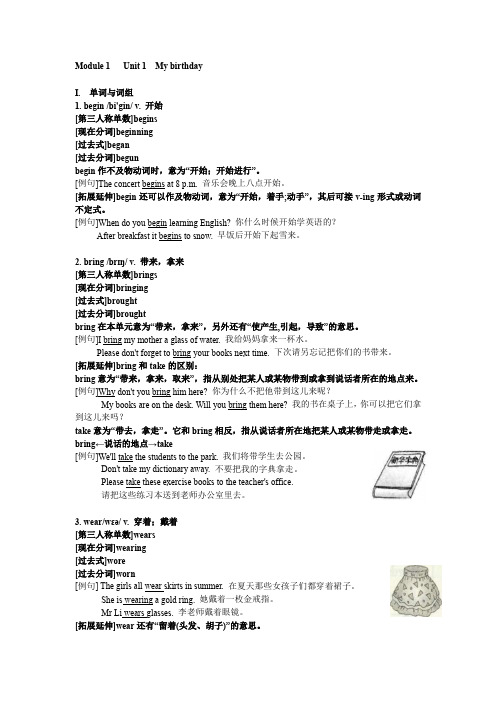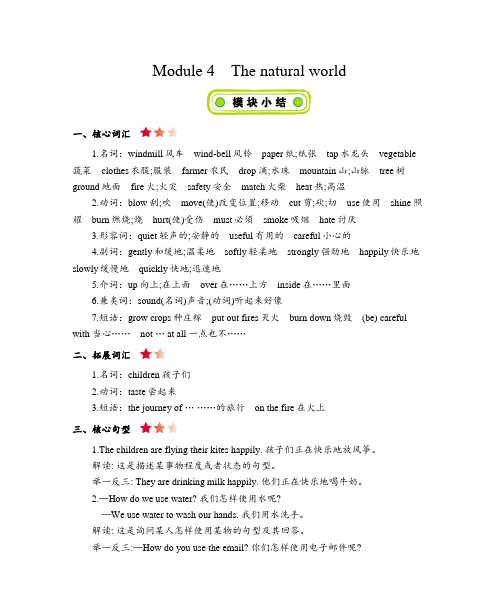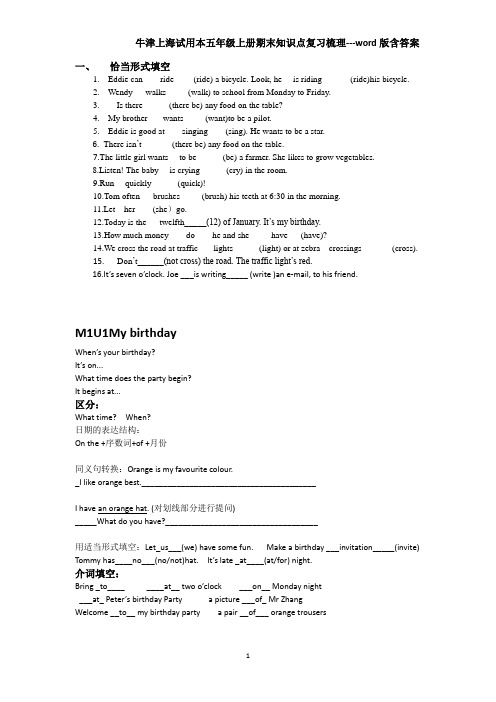牛津英语上海版五年级上册知识点整理
- 格式:doc
- 大小:93.00 KB
- 文档页数:8

M1U1 Can I do this?1. 用‘there’作为开头表示事实,例如:There’s the red man。
2。
用祈使句发指令。
例如:Cross! Go! Wait!3. 用祈使句的否定形式禁止他人做某事。
例如:Don’t Cross the road。
Don't smoke。
Don’t make a noise.4。
用名词表达事物。
例如:The traffic light’s red.5。
用情态动词can征求允许。
例如:Can I go out , Mum?6. 用Here you are回答问题。
(给你)7. 用现在进行时表达正在进行的事情。
例如:They are going out。
8。
用一般现在时态表达简单的事实。
例如:They are on the train。
9. 学习用which对定语提问。
例如:Which sign means ‘Don’t eat or drink’?(哪一个标志的意思是“禁止吃喝”)10. 用I’m sorry. 表达歉意。
11. 在否定句中用or代替and。
例如:Don’t eat or drink.M1U2 This is what I want1. 用What do you want ? 询问“你想要什么?”2. 用I want…表达要求。
例如:I want some paper.3. 学习用Here’s /Here are …表达“给你… …”。
4。
用Thank you very much.表达感谢。
5。
用形容词修饰东西。
例如:a large Coke (一大罐可乐)6。
用情态动词can征求许可。
例如:Can I have some fish,please?7。
学习关于菜的名称。
例如:noodles、vegetablesM1U3 This is what I need1。
关于学习用品的单词。
例如:books.2。
用’What do you need for school ?' 询问“你上学需要什么?"3。

Module 1 Unit 1 My birthdayI. 单词与词组1. begin /bi'gin/ v. 开始[第三人称单数]begins[现在分词]beginning[过去式]began[过去分词]begunbegin作不及物动词时,意为“开始;开始进行”。
[例句]The concert begins at 8 p.m. 音乐会晚上八点开始。
[拓展延伸]begin还可以作及物动词,意为“开始,着手;动手”,其后可接v-ing形式或动词不定式。
[例句]When do you begin learning English? 你什么时候开始学英语的?After breakfast it begins to snow. 早饭后开始下起雪来。
2. bring /brɪŋ/ v. 带来,拿来[第三人称单数]brings[现在分词]bringing[过去式]brought[过去分词]broughtbring在本单元意为“带来,拿来”,另外还有“使产生,引起,导致”的意思。
[例句]I bring my mother a glass of water. 我给妈妈拿来一杯水。
Please don't forget to bring your books next time. 下次请另忘记把你们的书带来。
[拓展延伸]bring和take的区别:bring意为“带来,拿来,取来”,指从别处把某人或某物带到或拿到说话者所在的地点来。
[例句]Why don't you bring him here? 你为什么不把他带到这儿来呢?My books are on the desk. Will you bring them here? 我的书在桌子上,你可以把它们拿到这儿来吗?take意为“带去,拿走”。
它和bring相反,指从说话者所在地把某人或某物带走或拿走。
bring←说话的地点→take[例句]We'll take the students to the park. 我们将带学生去公园。

Module 4The natural world一、核心词汇1.名词:windmill风车wind-bell风铃paper纸;纸张tap水龙头vegetable 蔬菜clothes衣服;服装farmer农民drop滴;水珠mountain山;山脉tree树ground地面fire火;火灾safety安全match火柴heat热;高温2.动词:blow刮;吹move(使)改变位置;移动cut剪;砍;切use使用shine照耀burn燃烧;烧hurt(使)受伤must必须smoke吸烟hate讨厌3.形容词:quiet轻声的;安静的useful有用的careful小心的4.副词:gently和缓地;温柔地softly轻柔地strongly强劲地happily快乐地slowly缓慢地quickly快地;迅速地5.介词:up向上;在上面over在……上方inside在……里面6.兼类词:sound(名词)声音;(动词)听起来好像7.短语:grow crops种庄稼put out fires灭火burn down烧毁(be) careful with 当心……not … at all一点也不……二、拓展词汇1.名词:children孩子们2.动词:taste尝起来3.短语:the journey of ………的旅行on the fire在火上三、核心句型1.The children are flying their kites happily. 孩子们正在快乐地放风筝。
解读: 这是描述某事物程度或者状态的句型。
举一反三: They are drinking milk happily. 他们正在快乐地喝牛奶。
2.—How do we use water? 我们怎样使用水呢?—We use water to wash our hands. 我们用水洗手。
解读: 这是询问某人怎样使用某物的句型及其回答。
举一反三:—How do you use the email? 你们怎样使用电子邮件呢?—We use the email to make friends. 我们用电子邮件交朋友。

沪教牛津英语五年级上册知识点归纳1.用‘ there作’开表示事 ,例如: There ’ s the red man。
2.用祈使句指令。
例如: Cross! Go! Wait!3.用祈使句的否定形式禁止他人做某事。
例如:Don’ t Cross the road. Don’ t smoke. Don’make a noise.4.用名表达事物。
例如: The traffic light’ s red.5.用情 can 征求允。
例如: Can I go out , Mum?6.用 Here you are 回答。
(你 )7.用在行表达正在行的事情。
例如:They are going out 。
8.用一般在表达的事。
例如:They are on the train.9.学用 which 定提。
例如: Which sign means ‘ Don’ t eat or drink’?(哪一个志的意思是“禁止吃喝”)10.用 I ’ m sorry表.达歉意。
11.在否定句中用 or 代替 and 。
例如: Don’ t eat or drink.M1U2 This is what I want1.用 What do you want ?“你想要什么?”2.用 I want ⋯表达要求。
例如: I want some paper.3.学用 Here’ s /Here are 表⋯达“ 你⋯ ⋯”。
4.用 Thank you very much. 表达感。
5.用形容修西。
例如: a large Coke (一大罐可)6.用情 can 征求可。
例如: Can I have some fish, please?7.学关于菜的名称。
例如: noodles 、 vegetablesM1U3 This is what I need1.关于学用品的。
例如: books 。
2.用’ What do you need for school ? ’“你上学需要什么?”3.用 We need ⋯表达“我需要⋯ ⋯”。

M1U1第2页get to know you 了解你an ‘orange’ party 一个橘色派对come to my birthday party 来参加我的生日聚会on Sunday 在周日on the ninth of September = on September the ninth 在九月九号at two o’clock in the afternoon = at 2:00 p.m. 在下午两点bring or wear some orange things to the party 带或穿一些橘黄色的东西来参加聚会my favourite colour 我最喜欢的的颜色be moved 很感动的That sounds interesting/ funny. 听起来很有趣/滑稽。
I can’t wait. 我等不及了。
give sb a big surprise 给某人一个惊喜be surprised 很惊讶的第3页1. 单词:一月到十二月in January, February, March, April, May, June, July, August, September, October, November, December2. 序数词:第一到第三十一见书序数词前+the 例如:the first第4页at Peter’s birthday party 在Peter的生日聚会上 a pair of orange trousers 一条橘色裤子a picture of you /him/her 一张你的图片make your own(invitaion) 做你的请柬have some fun = have a good time = enjoy ourselves 玩得开心make a birthday invitation 做一张生日请柬invite sb to the party 邀请某人去聚会live in Room 301 住在301室live on Yongqing Road 住在永清路live at Room 301, Building 9, 58 Yongqing Road 住在永清路58号9号楼301室近义词(同义词):begin – start interesting – funny present – gift复数:party – parties Sunday – Sundays第5页Tommy’s birthday present Tommy的生日礼物be busy doing sth. 忙于做某事the next morning 第二天早上 a smart new hat 一顶漂亮的新帽子a hat maker 一个做帽子的人be tired of sweets 厌倦糖果be late for school 上学迟到反义词:come – go bring – take interesting – boring busy – free sad – happy late – early next – last new – old easy – hard / difficult第6页drill 钻孔least 最少at least 至少leave 离开leave home 离开家last but not least 最后但也是最重要的(用于作文最后一段)句型1. When does the first class begin? It begins at 8:30.(begin 是动词,不要与is连用,三单动词加“s”。

一、恰当形式填空1.Eddie can____ride____ (ride) a bicycle. Look, he __is riding______ (ride)his bicycle.2.Wendy___walks_____(walk) to school from Monday to Friday.3.__Is there______(there be) any food on the table?4.My brother ___wants_____(want)to be a pilot.5.Eddie is good at____singing____(sing). He wants to be a star.6._There isn’t_______(there be) any food on the table.7.The little girl wants __to be______(be) a farmer. She likes to grow vegetables.8.Listen! The baby __is crying______(cry) in the room.9.Run __quickly______(quick)!10.Tom often___brushes_____(brush) his teeth at 6:30 in the morning.11.Let__her____(she)go.12.Today is the___twelfth_____(12) of January. It’s my birthday.13.How much money____do____he and she_____have___(have)?14.We cross the road at traffic ___lights______(light) or at zebra__crossings_______(cross).15.___Don’t______(not cross) the road. The traffic light’s red.16.It’s seven o’clock. Joe ___is writing_____ (write )an e-mail, to his friend.M1U1My birthdayWhen’s your birthday?It’s on...What time does the party begin?It begins at...区分:What time? When?日期的表达结构:On the +序数词+of +月份同义句转换:Orange is my favourite colour._I like orange best.________________________________________I have an orange hat. (对划线部分进行提问)_____What do you have?___________________________________用适当形式填空:Let_us___(we) have some fun. Make a birthday ___invitation_____(invite) Tommy has____no___(no/not)hat. It’s late _at____(at/for) night.介词填空:Bring _to____ ____at__ two o’clock ___on__ Monday night___at_ Peter’s birthday Party a picture ___of_ Mr ZhangWelcome __to__ my birthday party a pair __of___ orange trousers默写:序数词第一到第十,第二十以及十二个月份First second third ,fourth,fifth,sixth,seventh,eighth,ninth, tenth,twentieth, 注意第九要去e+th; twelfth,fifth,第五,第十二;要去ve为f+th ,January,February,March,April,May,June,July,August,September,October,November,December;写作:Birthday presentsToday is the twentieth of July. It is my birthday. I’ve got a lot of presents for my family. My father gives me a new schoolbag. My mother buys me a new dress. My sister gives me a red pencil case. My brother buys me a nice pen. Oh, I love my birthday presents very much.你也试着写一写吧?音标:读一读,并请用横线划出对应音标的字母或字母组合M1U2 My way to schoolHow do you come to school? I come to school...同义句转换:Ben rides his bike to school.__Ben_goes to school by bike.__________Kitty always walks to school._______________________________________He goes to school by underground.____He takes an underground to school.___________________________________I live near school. ___I don’t live far from school.__________________________________(改为否定句但保持句意不变)对划线部分提问:Kitty always walks to school._______________________________________选词填空:She is only three years old. She is _______(always/never/often) rides.Alice and I always ___walk___(walk) to school.get __off___ (off/of)the trainHe leaves home __at____(at/for/on) about seven o’clock.适当形式填空:_Finally_____(final),he walks from the bus stop to school.默写:出租车地铁:斑马线:交通信号灯: 人行道:Taxi underground zebra crossing traffic lights pavement7:45 8:15 9:30 12:00A quarter to eight a quarter past eight half past nine twelve o’clock介词填空:Wait _for____ the green light wait _on____ the pavement walk __to___ schoolLook __at___ this poster live __on___ Green Road ___in__ the morningwait _on____ the pavement __for___ the green light cross the road __at____ traffic lightsMr Black’s journey ___to__ work stay __on____ the bus_for_____(for /at) about fifteen minuteswalks _from_____ the bus stop__to___ school.Arrive __at__school arrive _in_____Shanghai写作:同学们,你平时都是怎样去学校的呢?请根据所给提示写一篇小短文,要求不少于50个单词。
沪教版(上海)牛津英语 5a 知识点汇总词组1. at Peter ' s birthday party 在 Peter 的生日聚会上2. on the 19thofSeptember 在 9 月 19 日on Sunday 在 周 日4 . at two o 'clock 在 两 点5. in the afternoon 在下 午6.at night 在晚上7. sb. be tired某人 很 累8.my favouritecolor我最喜欢 的颜色 9.That sounds interesting. 那听上去有趣生日快乐. 欢 10. I can ' t wait! 我等不及了! 11. Happy Birthday!12 . Welcome tomy party 迎来我的派对 13. a pair of orange trousers 一条橙色的裤子 14. make a birthdayinvitation 制作一张生日请帖15.make ahat 制作一顶帽子16.have some fun 过得高兴 17. birthdaypresent 生日礼物注意, what time 也可用来询问时间,但它通常询问某一时刻。
五.课文学习1. When is your birthday ? It is on the 19th of September.when 用作疑问副词,引导特殊疑问句,指“什么时候”。
用来对时间进行提问。
例如:We'll go over it a second time . 我们再念第二遍。
⑶日期的写法可以采用基数词和序数词两种形式。
例如:March 1 也可以写成 March 1st ; May 29 也可以写成 May 29th 。
但是,日期的读法只能用序数词的形式。
Module1 Unit1 一,核心词汇 第一 8.begain 开始 1.first 会2.second9.bring第二 3.third 第三 4.fourth 带来 10.wear 穿着 11.favourite第四 5.fifith 第五 6.sixth 第六 7.party 派对,聚 最喜欢的⑴ When will you come tosee me?你什么时候要来看我? When are they going to visitthe GreatWall?他们打算什么时候去游览长城? ⑵序数词在句中可作主语、宾语、定语和表语。
M1U1 Can I do this?1. 用,there?作为开头表示事实,例如: There?s the red man 。
2. 用祈使句发指令。
例如: Cross! Go! Wait!3. 用祈使句的否定形式禁止他人做某事。
例如: Don?t Cross the road. Don?t smoke. Don?t make a noise.4. 用名词表达事物。
例如: The traffic light?s red.5.用词 can 征求允许。
例如: Can I go out , Mum?6. 用 H ere you are 回答问题。
(给你)7. 用现在进行时表达正在进行的事情。
例如: They are going out 。
8. 用一般现在时态表达简单的事实。
例如: They are on the train.9. 学习用 which 对定语提问。
例如: Which sign means ,Don?t eat or drink??(哪一个标志的意思是“禁止吃喝”)10. 用 I ?m sorry. 表达歉意。
11. 在否定句中用 or 代替 and 。
例如: D on?t eat or drink.M1U2 This is what I want1. 用 W hat do you want ?询问“你想要什么? ”2. 用 I want ⋯表达要求。
例如: I want some paper.3. 学习用 Here?s /Here are 表⋯达“给你⋯ ⋯ ”。
4. 用 Thank you very much. 表达感谢。
5. 用形容词修饰东西。
例如: a large Coke (一大罐可乐)6.用词 can 征求许可。
例如: Can I have some fish, please?7.学习关于菜的名称。
例如: noodles 、 vegetables M1U3 This is what I need 1. 关于学习用品的单词。
五年级英语时态复习、练习动词的适当形式填空:1. Look, my father____________(watch) TV at home, but I ___________(do)my homework.2. My mother usually __________(go) to work at 7:00 every morning.3. Tomorrow morning I __________(fly) a kite.4. When _______ your brother often __________(do) his homework?5. Let’s _________(play) tennis after school.6. All the students must _________(keep) school rules.7. There ______(be) one teacher and three students in the music room just now.8. What ______ you _________(do) last Sunday? I ________(write) a letter to pen pal.9. There ______(be) cinema in our community last year. There _______(be) a cinema and a library in it now.10. He usually________(have) bread and milk for breakfast.11. At a young age, she _______(study) hard and _______(read) a lot of books.12. _______(not) talk. Grandma _______(sleep) under the tree.13. When _______you ________(come) back last night? We ______(come) back at 10:00.14. My classmate, John _______(come) here before 8:00 tomorrow morning,15. When he was young, he always _______(read) in the library.16. Look, the man _________(knock) at the door.17. -What ________ you usually _________(have) for your breakfast? -I usually _______(have) some bread and milk18. Healthy children __________(eat) a lot of fruit and vegetables.19. -__________ Sandy ________(like) playing basketball? -No, he _________(like) playing football. He can ________(play) it very well.20. The girl __________(read) English every morning. She __________(be) interested in English.21. -Where _______ you _______(go) tomorrow? -I ____________(go) to the library.22. Look! That _______ (be) my father. He _________ (talk) with Mr White.23. -_________ your father often __________ (go) to the gym? -Yes, he _______(do).24. We ____________(visit) Beijing next week. How happy!25. -What ________ Tom _________(do) now? -He __________(read) a book in his room.26. Sandy and I ________(be) good friends. We _________ (study) together. We _________(play) together.27. Look! That _______ (be) my father. He _________ (talk) with Mr White.28. -_________ your father often __________ (go) to the gym? -Yes, he _______(do).29. We ____________(visit) Beijing next week. How happy!30. -What ________ Tom _________(do) now? -He __________(read) a book in his room.31. Sandy and I ________(be) good friends. We _________ (study) together. We _________(play) together.32. Must I ______ (do) homework now? No, you _________.33. My friend Julia often _______(have) lunch at school. But I _______(not have) lunch at school.34. Mingming _________(sweep) the floor just now.35. Look, ___ the child _________ (dance) quite well? Yes, all the people there _________________ (watch) him.36. Many foreigners ____ (be) in Shanghai last month. They ____ (have) a great time to visit the Expo Site here.37. Kitty __________ (go) to the library tomorrow afternoon.38. My teacher __________ (give) me a wonderful book yesterday.39. __________ your father __________ (drive) to work every day?40. __________ (not talk) to each other here. The little baby __________ (sleep) in the bedroom.改句子复习Unit11. There’s an old office on the first floor. (划线提问)__________________________________________________________ 2. We must finish our homework on time. (一般疑问句并作否定回答) __________________________________________________________ 3. Must I play football in the playground? (否定回答)__________________________________________________________ 4. Students mustn’t eat or drink in class. (划线提问)__________________________________________________________ 5.Don’t speak loudly in the classroom. (意思不变,用其他句型改写) __________________________________________________________ Unit21.We must finish our homework.(一般疑问句,否定回答)2.No shouting in the library .(写出意思相同的句子)3.She does her housework at home . (否定句)4.Julia’s mother is a dentist. (划线部分提问)5.My friend comes from Washington. (划线部分提问)6.Annie goes to school by bike. (划线部分提问)Unit31. She reads picture books in the library. (划线提问)________________________________________________________ 2. We do morning exercises every day. (否定句)________________________________________________________3. My uncle usually does sports in the gym.(一般疑问句)________________________________________________________ 4. We must do our homework at school.(一般疑问句并作否定回答)________________________________________________________ 5. Does your sister study Chinese in the evening? (肯定句)________________________________________________________ Unit41. My bedroom is clean now. (用yesterday改为过去式)__________________________________________________________ 2. The children were happy last weekend. (一般疑问并否定回答)__________________________________________________________ 3. My father was forty-two at that time. (一般疑问并否定回答)__________________________________________________________ 4. We were in the park yesterday afternoon. (一般疑问并肯定回答)__________________________________________________________ _5. I was so glad last night. (一般疑问并肯定回答)__________________________________________________________ 6. Miss White was in London last year.(划线部分提问)__________________________________________________________ Unit51. My mother does housework every day.(用last week改写)_________________________________________________________ 2. He did his homework yesterday evening.(一般疑问句)_________________________________________________________ 3. There were ten pupils in the playground just now. (划线部分提问)_________________________________________________________ 4. I see a film last night. (一般疑问句,否定回答)_________________________________________________________ 5. I went to Beijing by plane last weekend. (划线部分提问)_________________________________________________________ 6. Norman didn’t finish his homework yesterday evening. (肯定句)_________________________________________________________。
Module1 Getting to know you
Unit1 My birthday
生词:
first second third fourth fifth sixth
音标:
语法:
When is your birthday?
It’s on the...of January/February/March/April/May/June/July/August/September/October/
November/December.
Unit2 My way to school
生词:
taxi underground zebra crossing traffic lights pavement
音标:
/i:/ /i/
e she me i it this
e_e these Chinese drill fish
ee bee sweet y easy very
ea sea read happy early
/e/ /æ/
e bed pet a dad back
a any many apple black
ea head bread
精选
语法:
How do you come to school?
I come to school...
Unit3 My future
生词:
worker pilot farmer cook shop assistant
音标:
语法:
What do you want to be?
I want to be a/an...
Module2 Me,my family and friends
Unit1 Grandparents
生词:
write an e-mail go shopping play chess
/p/ p pick map
/b/ b book job
/t/ t taste fruit
/d/ d date bad
/k/
k kite work
c cook picnic
ck clock duck
/g/ g game big
/a:/
/Λ/
音标:
语法:
How often...
Unit2 Friends
生词:
Same different both all
音标:
语法:
sb. both...(do)...
Unit3 Moving home
a class past u us club
ask bath duck puzzle
ar arm park o other son
sharp large love colour
/u:/
/ʊ/
u rule u sugar full
put pull
oo too school oo book look
room tooth cook foot
生词:
West north east south
音标:
语法:
Why...
Because...
Module3 Places and activities
Unit1 Around the city
生词:
Hotel bank hospital bakery museum cinema
音标:
语法:
/f/ f food roof
/v/ v van live
/θ/
th think tooth
/ð/ th that with
/s/ s sigh bus c city nice /z/ z zoo size s visit is /ts/ ts lights parts
boats rabbits
/dz/ ds cards clouds
hands beds
How do I get to...,please?
Walk along...
Unit2 Buying new clothes
生词:
button zip pocket
音标:
语法:
Which ... Do you like, the ... One or the ... One?
I like the ... One.
Unit3 Seeing the doctor
生词:
fever toothache cough cold
/ɔ:/
/ɒ/
or short horse o office box
al hall fall off wrong
au autumn naughty a what want
oor door floor watch
/ɜ:/ /ə/
er her term er teacher paper
ir bird third driver farmer
ur nurse turn a panda banana
音标:
语法:
What should I do?
You should...
Module4 The nature word
Unit1 Water
生词:
first next then finally
音标:
语法:
First/Next/Then/Finally,...
or work word again along
/tʃ/ /ʃ/
ch cheap rich sh share fish
China each shirt brush
/dʒ/ /ʒ/
g age giraffe s usually pleasure
orange cage television
j job juice
jam jump
Unit2 wind
生词:
gently stronger slowly quickly
音标:
语法:
It is blowing gently.
Unit3 Fire
生词:
Don’t smoke Don’t start campfires Don’t play near fires Don’t play with matches
音标:
/tr/ /dr/
tr tree try dr dress dry
train trunk drink draw
triangle traffic drive dream
/i:/ sheep /i/ ship /e/ bed /æ/ bad
/p/ pig /b/ big /t/ hat /d/ had
/k/ back /g/ bag /ɑ:/ father /ʌ/ brother
/u:/ food /ʊ/ foot /f/ leaf /v/ leave
/θ/
both /ð/ with /s/ piece /z/ please
/ɔ:/ water /ɒ/ what /ɜ:/ purple /ə/
paper
/tʃ/ rich /dʒ/ giraffe /ʃ/ sure /ʒ/
pleasure
语法:
We must/mustn’t...